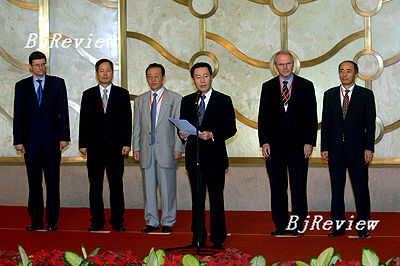
When this year's round of six-party talks on the denuclearization of North Korea started in February, few would have expected that the nuclear reactors at Yongbyon would be shuttered by mid-summer.
Previous summits moved slowly, sometimes seeming not to make progress at all. But at the delegation heads' meeting of the six-party talks on July 18-20, negotiators from North Korea, South Korea, China, Japan, the United States and Russia, quickly reached a milestone in getting North Korea to close Yongbyon nuclear reactor in return for oil. They also laid a clear blueprint for moving toward the full denuclearization of the entire Korean Peninsula based on an "action-for-action" program.
In the latest talks, North Korea repeated its promise to shut its nuclear facilities as initial steps to denuclearization, while other parties would provide 1 million tons of heavy fuel oil for the country. During the second phase of the sixth round of the six-party talks, which is expected to be held in September, the six parties' five special working groups will decide how to implement the next steps toward denuclearization and discuss economic and security cooperation in Northeast Asia.
Although the latest meeting went fairly smoothly, the talks' future progress will fall mainly on North Korea and the United States, Chinese foreign affairs experts said.
Tao Wenzhao, Deputy Director of the Institute of American Studies, Chinese Academy of Social Sciences, said that although the delegates did not reach a consensus on a denuclearization timetable as expected, they did set forth the tasks of the next phase of negotiations and the method for achieving them.
To get there, the North Koreans would have to make a "strategic choice" to implement the February 13 agreement, in which the country promised to commit itself to a follow-on phase that includes a provision to declare all nuclear programs and disable all existing nuclear facilities. Tao also said that trust between North Korea and the United States was needed.
"North Korea's shutting down its Yongbyon nuclear facilities was a crucial step, but the declaration part is even harder than that," Tao said, adding that the country should also say how much plutonium it has extracted, if it has enriched uranium and the number of nuclear warheads it has.
North Korea and the United States must develop a high level of mutual trust, or it will be very difficult for the North Koreans to declare their full nuclear power, Tao added.
Qi Baoliang, an expert on Korean issues at the China Institutes of Contemporary International Relations, said that with the "action-for-action" program, North Korea will stick to its benefits from the agreement.
During the July 18-20 meeting, Kim Kye Gwan, North Korea's chief negotiator and Vice Minister of Foreign Affairs, iterated that his country was ready to cooperate to make the peninsula nuclear free, but that the precondition "is that other countries should fulfill their obligations."
Qi also pointed out that North Korea is requiring that the United States remove it from the U.S. list of terrorism-supporters and eliminate it from the Trading with the Enemy Act that restricts trade with countries hostile to the United States.
Qi also noted that the North Koreans and Americans have not agreed on the timing to start discussing these issues.
During the July meeting, Christopher Hill, head of the U.S. delegation to six-party talks and Assistant Secretary of State for East Asian and Pacific Affairs at the State Department, said he expected a broad framework for the next phase of the disarmament process, which would involve fully disabling Yongbyon, and that North Korea would make a full declaration of its nuclear activities.
| 